We are proud of everything our teams have accomplished this year!
View YES! Teams 2013-2014 in a larger map
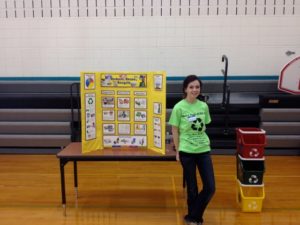
Atwater-Cosmos-Grove City (ACGC)
- Hosted an all-day energy expo that included energy-related businesses and organizations, recycling of cell phones, ink cartridges, holiday lights, tennis shoes, and paper, children’s activities, and lunch. They focused on “providing environmental education to their community members and initiating green thinking for a more eco-friendly future” and had nearly 200 people attend!
- Throughout the year they have collected 6.13 tons of paper, 250 pounds of holiday lights, 200 pounds of tennis shoes, and 723 ink cartridges and cell phones to be recycled.
- Currently compost using two compost tumblers.
- Several members of the YES! Team traveled to their local elementary school to read to 125 younger students about gardening.
- Are in the process of installing two hydration stations: one at the high school and one at the elementary school.
Austin
-
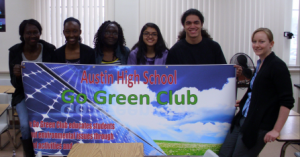
Members of the Austin High School YES! Team/Go Green Club Are working hard to bring solar to their school. So far they have raised over $8,000 for solar panels that will be installed at their school. They need $4,000 more to install the system that they have decided will be the best for their school. They have come up with creative fundraisers to acquire the funds they need including selling efficient light-bulbs and attempting a crowd-sourced funding campaign.
- Continue to recycle bottles, cans, paper, and cell phones. The students collect these recyclables every Wednesday morning.
Belgrade-Brooten-Elrosa (BBE)
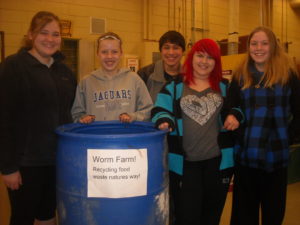
- Collected used sneakers for reuse/recycling through the Green Sneakers Program.
- Installed 1 hydration station.
- Have designed and plan to build a Supermileage vehicle.
- Are in the process of exploring creating a community garden and solar panels for their school.
- Tried out vermicomposting (worm composting).
Eden Valley-Watkins (EVW)
- Worked this year to accomplish tasks that directly impact their school culture and buildings.
- Expanded their hydration station program by promoting the stations, installing additional stations, and gaining support from the student body and administration.
- Initiated a food recycling program in their cafeteria to cut down on food waste.
- In the process of updating and rebooting their solar panel energy display to be more interactive for public viewing.
Gibbon-Fairfax-Winthrop (GFW)
- Collected 65 pounds of holiday lights for recycling.
- Increased their compost production by working in teams to sort and compost school lunch waste.
- Working in collaboration with their Plant Science Class, the School Garden project will be offered through community education this summer. This will involve members of the community in growing the produce, maintaining the garden, and improving production.
- Continue to monitor data from past projects including their hydration stations and solar panels.
Glencoe-Silver Lake (GSL)
- Built two vehicles to compete in the MTEEA Supermileage Challenge. They improved the vehicle they entered last year and increased their MPG from 164 to 425, exceeding their goal of 300 MPG.
- They also built a new E-85 vehicle which achieved 249 MPG.
- Check out their team website.
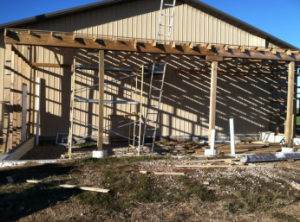
Lac qui Parle Valley (LQPV)
- After more than 2 years of planning, they built a 20’x40′ passive solar greenhouse and are planting and harvesting food for their school cafeteria.
- They have also sold their produce at a home/farm show at their school and promote their greenhouse by handing out fresh greens at sporting events.
-
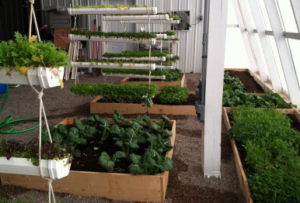
to reality They grew over 30 kinds of greens as well as several types of vegetables.
- Continue to maintain the used oil collection site in Madison.
Litchfield
- Are investigating bringing milk carton recycling to their school.
- Looked into a composting program at their Elementary School and have one worm-composting bin set up to compost all the food waste generated in their Family and Consumer Science room.
- Implemented battery recycling by organizing collection sites for used batteries.
- For the 3rd year, are participating in the One Vegetable, One Community program where they started kale plants and then gave them to 1st graders to take home and grow.
- Planted raspberry bushes and apple trees donated from the community.
Mankato West
- Partnered with Full Circle Organics to bring organics recycling to their high school as well as others in the district. So far they have diverted more than 125,000 tons of organics away from the landfill and to the Full Circle Organics composting facility in Good Thunder.
- Are planning to partner with their student council to bring hydration stations to their school. They have hot-wired some of the water fountains in their school to track their usage to try to determine which locations will make the most impact.
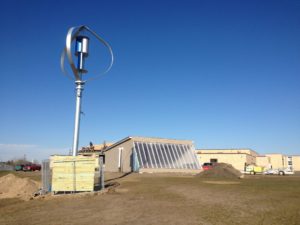
New London-Spicer (NLS)
- They are creating a community at their school that revolves around sustainable agriculture and responsible use of resources by reducing waste.
- This year they installed a passive solar greenhouse and tied in a vertical axis wind turbine. They are growing greens and studying the dynamics of the greenhouse.
- They are also working to get rid of milk carton waste in their school by switching to milk dispensers.
- Harvested and sold apples from the NL-S Orchard.
- Implemented Operation Bees, including obtaining beeswax from a local bee owner, made organic lip gloss and hand cream, sold items at the Kandi Mall to raise awareness for protecting pollinators from pesticides.
- Sold two different kinds of salads from their green house and bees wax products at the Prairie Woods Environmental Learning Center Earth Day Event.
- Created a Water Week with activities to promote the hydration stations in their schools.
- Collected heirloom seeds for distribution at a spring garden sale.
- Taught Outdoor Science to students in grades 1-3, which included energy conservation, clean energy production, sustainable growing and local foods, and habitat/species diversity and protection, all embedded in the MN science standards.
- Collected holiday lights for recycling.
New York Mills
- Took the next step in their long-term goal of a sustainable school garden and orchard. They are working with their school grounds crew to prepare for this project. They have a goal of a 20-30 tree apple orchard by 2017 and a school garden delivering 200-300 pounds of tomatoes, cucumbers, broccoli, and carrots by 2016.
- Worked to bring milk carton recycling to their school cafeteria.
Parkers Prairie
- Revamping their recycling system for public areas and classrooms in their Middle School and purchased and placed 5 recycling bins at locations throughout their school. They trained their peers in proper recycling habits at their school-wide Monday Morning Meeting so as not to place additional burden on their school custodial staff. Prior to this, about 90% of recyclable materials were being thrown away in their school.
Pine Island
-
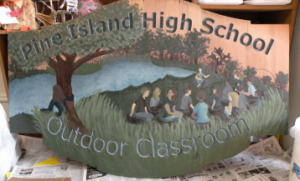
Pine Island High School Outdoor Classroom sign Finished up their outdoor classroom, which now includes a floating dock, beautiful sign advertizing the area, a boulder garden for seating, native trees with tree classification signs, bird houses, butterfly gardens, and walking trails.
- This winter they hosted a winter event as a “grand opening” to their outdoor classroom that included education and awareness about winter activities that residents can participate in outside in during the winter months and look forward to hosting more public events in this area.
- Are bringing an oil-recycling site to their community!
- Plan to bring composting to their school in the future.
- Installed another hydration station at their school by their gymnasium based on feedback from students and staff.
Redwood Falls
- Promoting recycling in their school.
- Learning about solar with YES! kits and activities.
Rocori
-
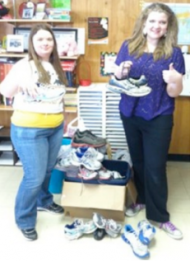
Students showing off all the shoes they collected from their peers and community members to be reused and/or recycled through Sneakers4Funds Continued with their assessment and monitoring the status of their recycling containers. They distributed recycling containers at optimum locations and collected the recycling weekly. They recycled more than 3 barrels of paper, 5 barrels of plastic bottles, and almost 2 barrels of aluminum cans per week. This is a significant increase over last year’s recycling outcomes.
- Collected 300 pairs of used tennis shows to be reused or recycled through Sneakers4Funds.
- Installed a hydration station. Will collect data to determine if they will install a second station.
- Students made posters and a video to promote the use of the hydration station.
- Collaborated with their school’s Entrepreneurship Class to promote and sell reusable water bottles.
- Are exploring options for school lunch waste reduction.
- At various events promoted recycling awareness and encouraged future membership in their YES! team.
Royalton
-
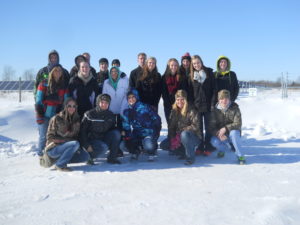
Royalton students touring the Solar Array at St. John’s Outdoor University during a YES! Winter Workshop there Designed and built a solar-powered trailer to haul their solar boat and/or electric vehicle to events. This trailer is powered using 3 240-watt panels.
- Designed, built, and installed benches for their outdoor classroom.
- Held a fundraiser to support their local senior center.
- Using SMART goals, the team worked to reduce school lunch waste by recycling milk cartons and separating lunch waste so it is easier for a local hog farmer to feed it to his hogs.
- Continued to promote and maintain the used motor oil collection site in their town.
- Designed and built a solar boat.
- Installed hydration stations at their school.
- Won the 2014 Red Wagon Award from the MN Alliance with Youth.
- Look for the Royalton team in parades this summer!
Sleepy Eye
-
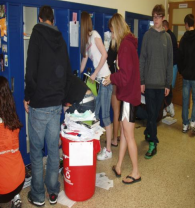
Students recycling the contents of the lockers during the “Biggest Loser” locker cleanout Are working on bringing composting to their school.
- Made reusable YES! bags and sold them at parent-teacher conferences to raise awareness of the team’s projects.
- Collected over 914 pounds of holiday lights for recycling!
- Educated their peers and their community about recycling and composting.
- Collected data on energy misers and hydration stations. They calculated that in their school vending machines with vending misers installed use 62% less energy than those without them installed. They also calculated that this means for their school vending misers have a payback period of about 1 year.
- Hosted “biggest loser” locker clean-outs to collect recyclables and paper.
- Presented to various community groups.
- Continue collecting and weighing recycling paper, aluminum, and plastic and expanded their recycling program with six new aluminum/plastic recycling containers.
- Designed and implemented an Earth Week at their local elementary school.
Springfield
-
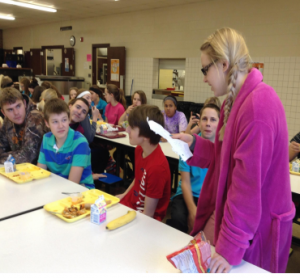
During YES! week, YES! students visited tables at lunch and challenged 7th-12th grade students with energy trivia Hosted a YES! week including dress-up days, Energy Jeopardy, games, explanations of their YES! projects, and a dance.
- Are planning an Energy Fair for next school year.
- Taught their local elementary school students about composting and energy-reduction.
- Collected over 624 pounds of holiday lights for recycling.
- Conducted river plantings in partnership with community members.
- Collaborated with school officials to bring hand dryers and hydration stations to their school.
- Investigated motion-detector lighting for various areas of their school to help their school become more energy-efficient.
St. Cloud (Apollo)
-
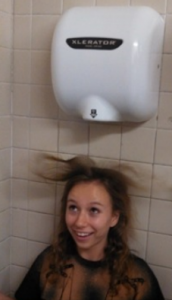
The new energy-efficient hand-dryers at Apollo are a blast! Increased their school’s rate of milk carton recycling by 40%
- Installed 4 hydration stations
- Are working to improve their school’s recycling program by adding recycling bins to hallways, adding and improving the signs on the containers, and educating staff on their recycling efforts and goals.
- Installed 20 new energy-efficient hand dryers (use 80% less energy than other hand dryers and a 90% cost savings over using paper towels) and 3 new water-efficient faucets.
- Hosted a Green Week to raise awareness for Earth Day, their YES! team, and ways to “be green”.
- Collected used electronics from their community for recycling
- Next year they plan to work with Stearns County Soil and Water Conservation District and the U.S. Fish and Wildlife Service to make a plan to restore the shoreline of Lake Apollo to reduce fertilizer run-off.
- Next year they also plan to start a composting program at their school.
St. Joseph (Kennedy Community School)
-
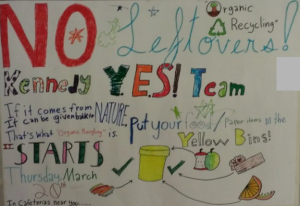
A sign made by the YES! students detailing the organics recycling process in their school This winter they collected 38 pounds of holiday lights that were then recycled.
- Began organics recycling in early March and titled this “Project No Leftovers”. Each YES! team member took shifts during all school lunches (pre-K through 8th grade) for three days to teach students what is organic and what is not. They plan to be instrumental in helping the school understand more about recycling in general as well as organics recycling.
- Students also wrote and recorded a video about organics recycling.
- They are currently recycling their organics at a rate of 1 cubic yard per day.
- In addition, they wanted to provide clarity for their trash and recycling bins to make sure everyone in the school knows what goes in each bin, so they ordered vinyl signs with pictures of what should go in each bin.
Westbrook-Walnut Grove (WWG)
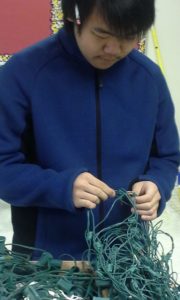
- Collected used cell phones for recycling. They surpassed their goal of 100 phones and collected 117 in part by trading hot dog meals for cell phones at the local grocery store. 100% of the money they raised by recycling these phones was given to a local charity, Martha and Mary’s Food Shelf.
- Continue to maintain their oil recycling site and jump-started a campaign to promote it by offering 6 free oil changes (4 of which were donated by local businesses) and information in local and regional papers. This resulted in an increase of 300% in usage of the site!
- Collected plastic bags for recycling from their school and community with the goal of collecting 10,000 bags.
- Continue to oversee the recycling bins in their school and donate the proceeds to the local volunteer fire department.
- Installed a passive solar scoreboard.
- Collected 123 pounds of holiday lights for recycling.
- Partnered with their city to enter data on the energy use of city buildings for the past 13 months into the B3 database in an effort document energy usage and reduce future electricity and water usage in the city.
- Designed and built various solar projects including a solar powered outlet, solar party lights, and a solar thermal heater. The solar heaters will be sold to community members for under $25 as a way to help save energy and money in a cost-effective manner.
- Created a pop-tab collecting competition between schools in their area in an effort to raise money for the Ronald McDonald House. Their goal was to collect 20,000 pop tabs and by the middle of their project they had already collected 80,000 pop tabs!
- Helped their school with a solar-powered mini golf course to be used at community events.
Yellow Medicine East (YME)
- Started the year off with a clean-up of the Crow River event where the team paddles 5 miles of the river looking for garbage.
- Are in the process of creating a community garden where elementary students are given an 8′ by 12′ plot in the garden to grow and eat whatever plants they desire. 20 elementary students are signed up, each with an adult sponsor. The YES! team members will assist the younger students in planting, weeding, and harvesting their gardens. They have also been involving members of their local community to help in this project.
